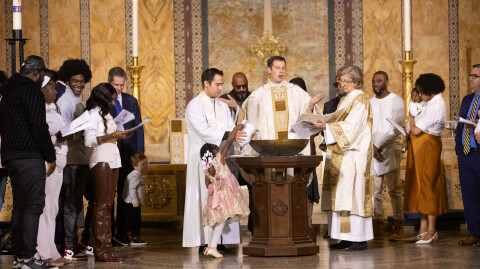I can vividly remember a conversation I had years ago with my wise and wonderful spiritual director. I was exploring ordained ministry and questioning how the church was responding to the concerns of those who were most disenfranchised in the poorest parts of the diocese. Our conversation meandered into the fiscal realities of churches in rural areas where attendance is down. I had a little bit of Judas in me when I challenged her saying that there seemed to be too much money being spent on buildings and not enough on the poor. I’ll never forget what she said, “In a place where the world feels gray and desolate, a beautiful white building, a place that is both open and aspirational, can be exactly what is needed.” As obvious as it may seem, I had never really thought of church as an aesthetic sanctuary. Instead of an unrelatable building that is a drain on diocesan coffers, it could be a place that is polished wood, refracted light and incense – a place where a person might be filled with relief from an ugly world.
In John’s Gospel this week, we find Jesus at the home of his friends Mary, Martha and Lazarus in Bethany. Jesus literally has a target on his back as Caiaphas declares that the signs Jesus is performing are attracting way too much attention. There is concern that the Romans will take notice and “destroy both our holy place and our nation” (Jn. 11:51). The handwriting is on the wall as Jesus’ days become numbered. Yet, we have a moment of reprieve as he is given a dinner by his friends. Martha serves Jesus while Mary anoints his feet with “a pound of costly perfume made of pure nard (Mary) anointed Jesus’ feet and wiped them with her hair. The house was filled with the fragrance of the perfume” (Jn: 12:3). Judas chastises Jesus about wasting money on extravagant oil instead of giving it to the poor and I was reminded of the words my spiritual director said to me. As Jesus gets ready to go to into Jerusalem to his certain death, why shouldn’t he be surrounded by fragrant beauty and attentiveness that speaks to the poetry of tenderness and love. Isn’t that a godly response to suffering?
As Jesus says, “you will always have the poor with you, but you will not always have me” (Jn:12:8). I have found these words to be comforting and helpful to me in my work at Sloan Kettering. There are moments where a demand for beds that exceeds capacity can feel defeating; the work never completed. This reality demands that the provider finds respite in ways that draw on the creative pastoral imagination through nature, beauty, art, poetry, architecture, music, and yes, scripture and community. Of course, these are the resources that we engage with our patients as well. This Sunday, the Rev. Meredith Ward will be speaking at the Forum with members of the pastoral support group on grief. We do not need to put ourselves in Jesus’ feet to know what it is to suffer, and do not need to sit with Mary to know what witnessing the death of a loved one feels like. But as we take this Lenten journey together, we should be comforted in the knowledge that we are in community with one another. We gather both in worship and in small groups for conversation to express our sorrow and to begin to find hope and healing together. As we make our way to Jerusalem, we can be sure that we are being lifted by the hope that is in the fabric of the liturgy and in the beauty of the sanctuary of this extraordinary church.




